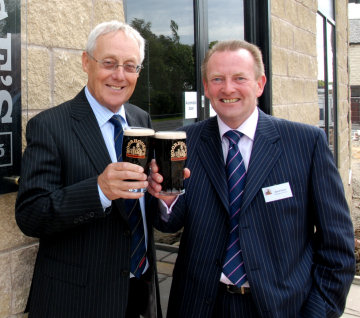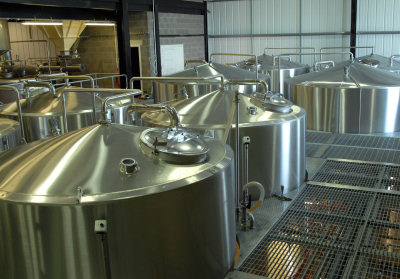 |

|
|

|
|
|
 |

home
about
features
A-Z
books

|

|

features
|

| |
Remarkable Moorhouse's
by Willard Clarke, 06/11
 Something amazing is happening in Burnley. "How much beer can you produce?" I ask David Grant, MD of Moorhouse's, as we stand on a gallery looking down on gleaming
mash tuns and coppers in the brew house (David Grant is right of picture, with owner Bill Parkinson).
"We can brew 1,000 barrels a week," he says. "That's two brews a day - at a pinch we could push three through." You don't need a degree in advanced maths to work out that that
adds up to 50,000 barrels a year. That makes Moorhouse's a big regional brewer - don't use the word "micro" here, for the company is four times the size of many long-standing family brewers.
Everything about Moorhouse's is remarkable. The brewery almost closed in 1985 but was rescued, re-built its business and acquired a small estate of six pubs. In 2000 it won the coveted
Champion Beer of Britain award from CAMRA for its dark mild, Black Cat. The publicity led to a dramatic increase in the sales of all the Moorhouse cask beers, including Pride of Pendle and
Pendle Witches Brew.
Brewing continued in a cramped site that dated from 1865, alongside equally cramped offices in a house that seemed in danger of falling down. The maximum amount of beer that could be
produced was 320 barrels a week and the site was creaking at the seams as demand for Moorhouse's beers went on rising.
This was happening in an area that had lost its mills and mines, and was cruelly affected by the recession. And yet five years ago plans were laid for a new brewery and offices to keep up
with the clamour for the beers. The cost was originally �3.2m but that grew rapidly to �4.5m. The enormous sum was funded by the Yorkshire Bank and directors and shareholders, with grants and
loans from the North-west Development Agency and Burnley Borough Council.
David Grant wipes make-believe sweat from his brow as he mentions the last two bodies, as the development agency is being wound-up and the local council has to trim its budget as a result of
central government cuts. "We got in just in time," he admits.
Moorhouse's is used to turbulence. The company was founded in 1865 by William Moorhouse as a general drinks manufacturer. His son developed "hop bitters" that were less than 2% alcohol and
were sold in Temperance bars and hotels at a time when the anti-alcohol lobby was a powerful voice and had the support of the Liberal Party. The Moorhouse family ran the company until 1978 and
it then changed hands four times in two years.
Something amazing is happening in Burnley. "How much beer can you produce?" I ask David Grant, MD of Moorhouse's, as we stand on a gallery looking down on gleaming
mash tuns and coppers in the brew house (David Grant is right of picture, with owner Bill Parkinson).
"We can brew 1,000 barrels a week," he says. "That's two brews a day - at a pinch we could push three through." You don't need a degree in advanced maths to work out that that
adds up to 50,000 barrels a year. That makes Moorhouse's a big regional brewer - don't use the word "micro" here, for the company is four times the size of many long-standing family brewers.
Everything about Moorhouse's is remarkable. The brewery almost closed in 1985 but was rescued, re-built its business and acquired a small estate of six pubs. In 2000 it won the coveted
Champion Beer of Britain award from CAMRA for its dark mild, Black Cat. The publicity led to a dramatic increase in the sales of all the Moorhouse cask beers, including Pride of Pendle and
Pendle Witches Brew.
Brewing continued in a cramped site that dated from 1865, alongside equally cramped offices in a house that seemed in danger of falling down. The maximum amount of beer that could be
produced was 320 barrels a week and the site was creaking at the seams as demand for Moorhouse's beers went on rising.
This was happening in an area that had lost its mills and mines, and was cruelly affected by the recession. And yet five years ago plans were laid for a new brewery and offices to keep up
with the clamour for the beers. The cost was originally �3.2m but that grew rapidly to �4.5m. The enormous sum was funded by the Yorkshire Bank and directors and shareholders, with grants and
loans from the North-west Development Agency and Burnley Borough Council.
David Grant wipes make-believe sweat from his brow as he mentions the last two bodies, as the development agency is being wound-up and the local council has to trim its budget as a result of
central government cuts. "We got in just in time," he admits.
Moorhouse's is used to turbulence. The company was founded in 1865 by William Moorhouse as a general drinks manufacturer. His son developed "hop bitters" that were less than 2% alcohol and
were sold in Temperance bars and hotels at a time when the anti-alcohol lobby was a powerful voice and had the support of the Liberal Party. The Moorhouse family ran the company until 1978 and
it then changed hands four times in two years.
the new era
In 1982 Alan Hutchinson seemed to put Moorhouse's back on even keel. He owned a chain of hotels, bingo halls and night clubs and he added Moorhouse's to supply his estate with beer. But
Hutchinson died suddenly in 1985 and his company was bought by Apollo Leisure, which had no interest in the brewery. Moorhouse's was put up for sale and seemed destined to close until Bill
Parkinson dropped in to a Burnley pub for a pint of Premier Bitter.
 In common with the man who liked the Remington razor so much he bought the company, Parkinson enjoyed his pint to such an extent that he bought the brewery. He had made his money as a manufacturer
of heavy lifting gear and he now poured his energy and experience into reinvigorating Moorhouse's, taking on David Grant, with a vast experience of the drinks industry, as his managing director.
Grant is bullish about the future. "The trade is growing at a phenomenal rate," he says. As well as the six tied pubs - the General Scarlett and the Stanley in Burnley, the Dusty Miller in Bury,
the Pendle Witch in Atherton, the Craven Heifer in Rawtenstall and the Rising Sun in Blacko - Moorhouse's has 300 free trade accounts and delivers direct within a 60-mile radius to Cumbria,
Cheshire, York and to Wetherspoon's as far south as Birmingham. Grant says that while the north-west has lost its industries there are still "fantastic pubs" in suburbs and villages. He
employs six salesmen who call on all their account every four weeks, taking orders for a month in advance. Free trade sales are up 15% on last year.
He plans to employ additional salesmen to attack the off-trade but Moorhouse's is, belt and braces, a cask beer brewery. The new brew house is a traditional ale plant, based on mash tuns and
coppers, and there are no plans to add either keg beer or lager. The brewhouse was built by Musk Engineering and the stainless steel vessels include a hop back and 12 fermenters: eight 100
barrel vessels and four 50 barrel ones. The brewhouse can rack 240 barrels an hour. Two silos hold 30 tons of grain each. Water that originates in the Pendle Hills comes from the public
supply and is "Burtonised" with the addition of salts.
Grant believes the future is sound because cask beer is not going through one its peaks that will be followed by a trough. The market is changing as young people, including a growing number of
women, are switching to real ale and they talk about the subject with great knowledge, down to identifying specific varieties of hops.
The new site includes facilities for training brewers and publicans and there are spacious rooms and bars for conferences and even wedding parties. Two chefs will be taken on who will use
locally-sourced ingredients and match beer with meals in a restaurant called the Cauldron.
"The new brewery has been built to last for 40 years," David Grant says. �4.5m is an eye-watering amount of money but Grant is optimistic the loans will be paid back on time. "It's
simple - we've got to sell more beer," he laughs. By George, I think he'll do it.
In common with the man who liked the Remington razor so much he bought the company, Parkinson enjoyed his pint to such an extent that he bought the brewery. He had made his money as a manufacturer
of heavy lifting gear and he now poured his energy and experience into reinvigorating Moorhouse's, taking on David Grant, with a vast experience of the drinks industry, as his managing director.
Grant is bullish about the future. "The trade is growing at a phenomenal rate," he says. As well as the six tied pubs - the General Scarlett and the Stanley in Burnley, the Dusty Miller in Bury,
the Pendle Witch in Atherton, the Craven Heifer in Rawtenstall and the Rising Sun in Blacko - Moorhouse's has 300 free trade accounts and delivers direct within a 60-mile radius to Cumbria,
Cheshire, York and to Wetherspoon's as far south as Birmingham. Grant says that while the north-west has lost its industries there are still "fantastic pubs" in suburbs and villages. He
employs six salesmen who call on all their account every four weeks, taking orders for a month in advance. Free trade sales are up 15% on last year.
He plans to employ additional salesmen to attack the off-trade but Moorhouse's is, belt and braces, a cask beer brewery. The new brew house is a traditional ale plant, based on mash tuns and
coppers, and there are no plans to add either keg beer or lager. The brewhouse was built by Musk Engineering and the stainless steel vessels include a hop back and 12 fermenters: eight 100
barrel vessels and four 50 barrel ones. The brewhouse can rack 240 barrels an hour. Two silos hold 30 tons of grain each. Water that originates in the Pendle Hills comes from the public
supply and is "Burtonised" with the addition of salts.
Grant believes the future is sound because cask beer is not going through one its peaks that will be followed by a trough. The market is changing as young people, including a growing number of
women, are switching to real ale and they talk about the subject with great knowledge, down to identifying specific varieties of hops.
The new site includes facilities for training brewers and publicans and there are spacious rooms and bars for conferences and even wedding parties. Two chefs will be taken on who will use
locally-sourced ingredients and match beer with meals in a restaurant called the Cauldron.
"The new brewery has been built to last for 40 years," David Grant says. �4.5m is an eye-watering amount of money but Grant is optimistic the loans will be paid back on time. "It's
simple - we've got to sell more beer," he laughs. By George, I think he'll do it.
|
|
home
about
features
A-Z
books
|

